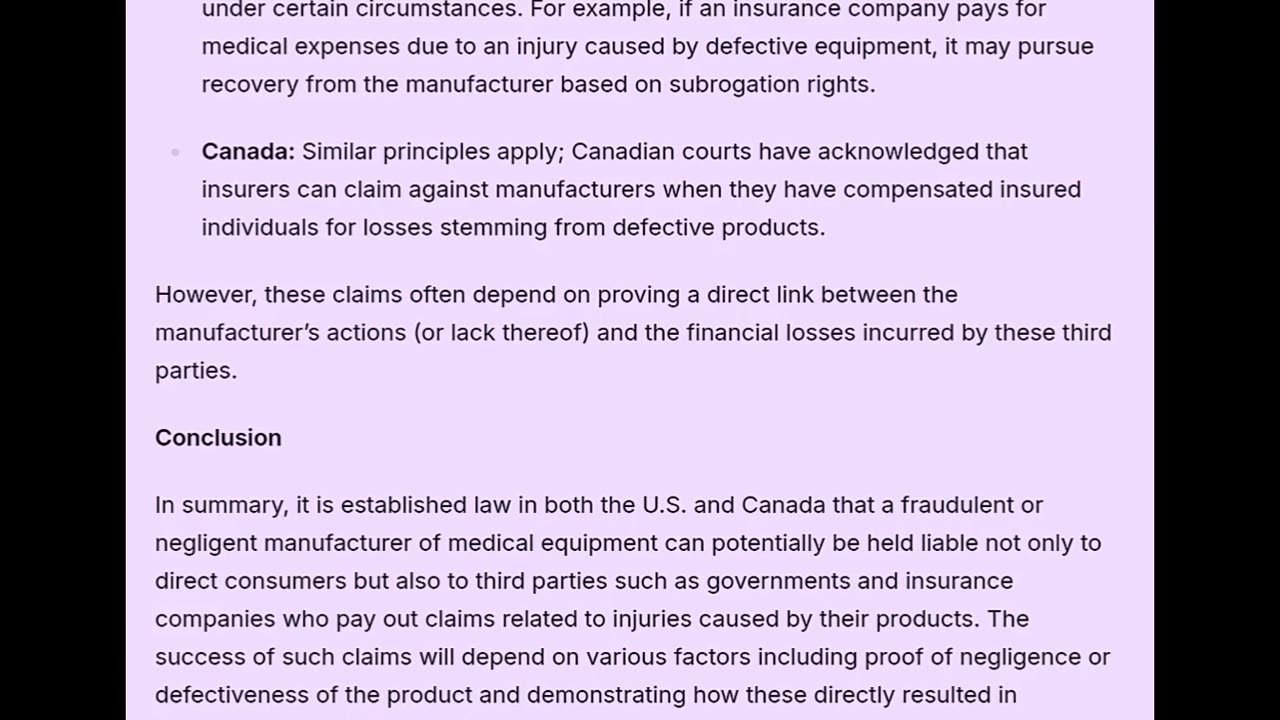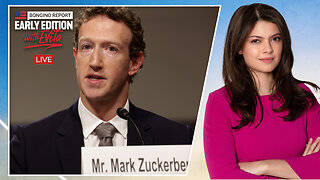Premium Only Content

EXHIBIT "O" - XIXI ASKS AI:
EXHIBIT "O" - XIXI ASKS AI:
Is it established law in US and Canada, both being English common law jurisdictions, that a fraudulent or negligent manufacturer of medical equipment that sells directly to disabled and elderly patients, can be liable to third-parties such as governments and insurance companies paid out to these patients, or their beneficiaries?
According to Ask AI & Question AI www.iAsk.ai:
Is it established law in US and Canada, both being English common law jurisdictions, that a fraudulent or negligent manufacturer of medical equipment that sells directly to disabled and elderly patients, can be liable to third-parties such as governments and insurance companies paid out to these patients, or their beneficiaries?
In both the United States and Canada, the legal principles surrounding liability for manufacturers of medical equipment are rooted in tort law, particularly in the concepts of negligence and strict liability. The question at hand involves whether a manufacturer can be held liable not only to the direct consumers (in this case, disabled and elderly patients) but also to third parties such as governments and insurance companies that may incur costs related to the injuries or damages caused by defective products.
1. Negligence and Duty of Care
Under common law principles, a manufacturer has a duty of care towards its consumers. This means that they must ensure that their products are safe for use. If a manufacturer is found to be negligent—meaning they failed to meet this duty—they can be held liable for any resulting harm. In cases where medical equipment is involved, if it is proven that the manufacturer acted negligently (for example, by failing to conduct adequate safety testing), they could indeed face liability for injuries sustained by users.
However, when considering third-party claims—such as those from governments or insurance companies—the situation becomes more complex. Generally, these entities would need to demonstrate that they have incurred specific damages due to the manufacturer’s negligence. For instance, if an insurance company pays out claims for injuries caused by defective medical equipment, it may seek recovery from the manufacturer under theories such as subrogation.
2. Strict Liability
In addition to negligence claims, manufacturers can also be held liable under strict liability principles. This legal doctrine holds manufacturers accountable for defects in their products regardless of fault or intent. If a product is deemed unreasonably dangerous due to design flaws or manufacturing defects—and this defect causes injury—the manufacturer may be liable even if they exercised all possible care in producing the product.
This principle applies similarly in both the U.S. and Canada; however, specific applications can vary based on jurisdictional laws and precedents.
3. Liability Towards Third Parties
The question specifically addresses whether manufacturers can be liable to third parties like governments or insurance companies. In general:
United States: Courts have recognized that third parties may have standing to sue under certain circumstances. For example, if an insurance company pays for medical expenses due to an injury caused by defective equipment, it may pursue recovery from the manufacturer based on subrogation rights.
Canada: Similar principles apply; Canadian courts have acknowledged that insurers can claim against manufacturers when they have compensated insured individuals for losses stemming from defective products.
However, these claims often depend on proving a direct link between the manufacturer’s actions (or lack thereof) and the financial losses incurred by these third parties.
Conclusion
In summary, it is established law in both the U.S. and Canada that a fraudulent or negligent manufacturer of medical equipment can potentially be held liable not only to direct consumers but also to third parties such as governments and insurance companies who pay out claims related to injuries caused by their products. The success of such claims will depend on various factors including proof of negligence or defectiveness of the product and demonstrating how these directly resulted in financial losses for those third parties.
Top 3 Authoritative Sources Used in Answering this Question:
American Law Institute (ALI): The ALI publishes influential legal standards including Restatements of Law which clarify tort principles including negligence and strict liability.
Canadian Tort Law Textbooks: These provide comprehensive insights into how tort law operates within Canadian jurisdictions regarding product liability.
Legal Journals on Product Liability: Peer-reviewed articles discussing case law developments provide current interpretations of how courts handle liability issues involving manufacturers and third-party claims.
-
 LIVE
LIVE
Caleb Hammer
1 hour agoMost Childish Couple I've Ever Had On Financial Audit
163 watching -
 1:08:35
1:08:35
Graham Allen
3 hours agoNEWSOM IS TO BLAME! Fires Spread As Dems Blame Trump! + Biden Claims He Could Have “Beaten Trump”
59.4K15 -

Matt Kohrs
9 hours agoIT'S A MARKET BLOODBATH!!! (Bitcoin, Nvidia, Tesla & More) || The MK Show
51.5K5 -
 45:40
45:40
BonginoReport
5 hours agoZuckerberg Tattletales on Government He Installed (Ep.117) - 01/13/2025
80.6K88 -
 1:59:42
1:59:42
Jeff Ahern
3 hours ago $2.46 earnedMonday Madness with Jeff Ahern( 6am pacific)
31K -
 15:06
15:06
Misha Petrov
13 hours agoBonnie Blue Is a CREEP
11.1K11 -
 46:05
46:05
PMG
12 hours ago $0.60 earned"Hannah Faulkner and Philip Toppino | Where Our Families Train"
10.7K -
 1:22:21
1:22:21
TheDozenPodcast
22 hours agoBroadmoor, bare knuckle, recovery: Ben Hatchett
65.4K2 -
 10:58
10:58
Degenerate Jay
1 day ago $11.60 earnedThe Rejected Deadpool And Wolverine Joke That Was Too Far For Disney
116K8 -
 13:00
13:00
Dermatologist Dr. Dustin Portela
17 hours ago $8.50 earnedAnother Insurance Company Harming Patients - Doctor Explains
88.7K6